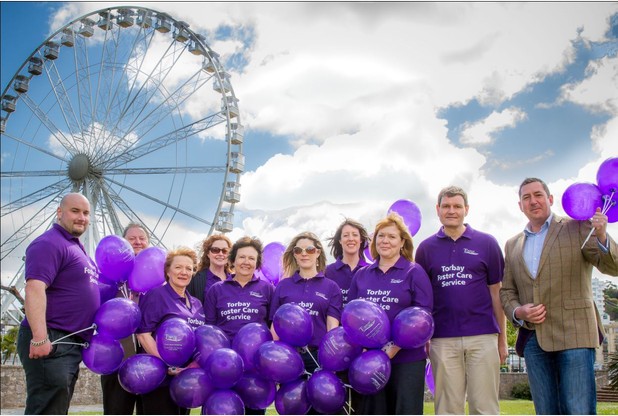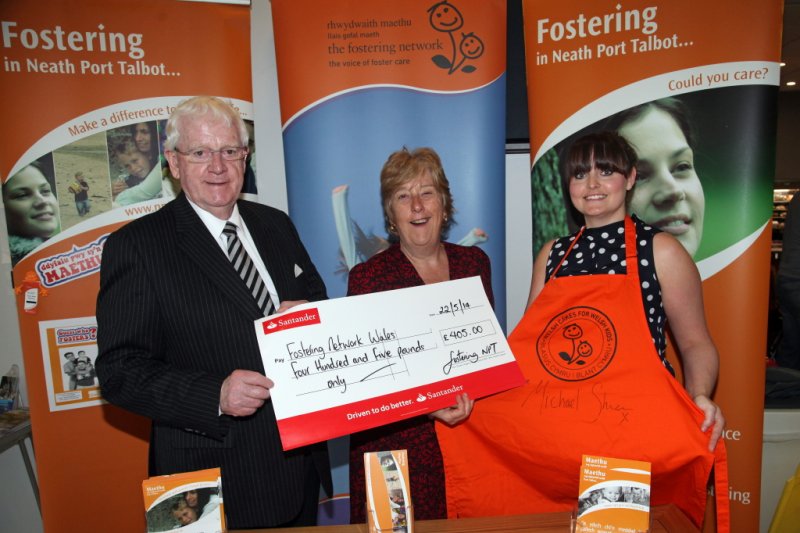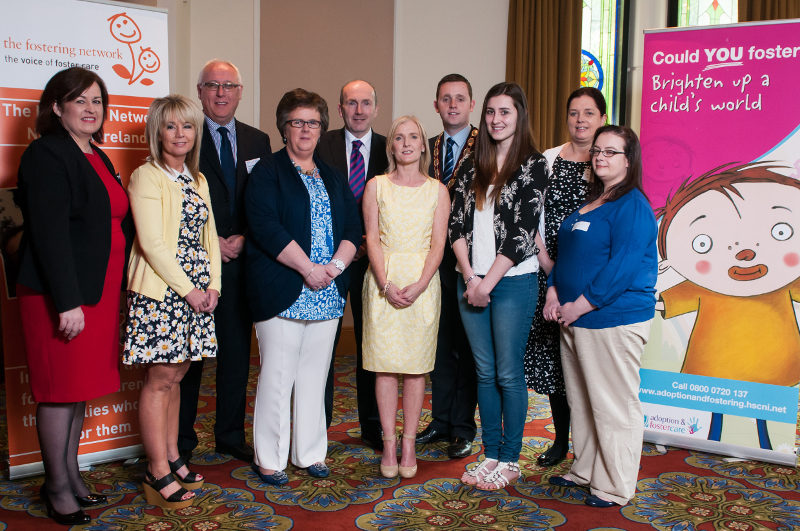Attracting and Keeping Carers - June 2014
We’ve put together a short(ish) survey to evaluate this year’s Foster Care Fortnight campaign. Please do spend a few minutes to feedback and help us plan future Foster Care Fortnights, your views do make a difference. I know I’m probably boring you with my next ask, but I can’t stress how important and useful the data tracking tool is, not only to us but potentially to you too to judge the campaign’s impact on recruitment. In the edited words of a sporting super brand, please, just do it :-)
This month’s blog shares some more of the other eye-catching activities from the fortnight and other news in foster care. With this month’s Fathers’ Day, IN FOCUS poses questions and ideas regarding men who care.
Why I became a foster carer at 26
We were thrilled to secure a slot on the BBC Breakfast sofa in the second week of Foster Care Fortnight, in no small part thanks to foster carer Nicola Lonsdale from Tameside. The story highlighted the need for younger people to consider becoming a foster carer and talked about Nicola’s decision to foster at the age of 26.
You can watch Nicola’s interview alongside the Fostering Network’s chief executive Robert Tapsfield. The story was also covered later the same day on Five Live with Robert and foster carers Gemma and Gordon Waters from West Lothian, with a follow-up last week on Woman’s Hour, again with Gemma, our director in Scotland Sara Lurie and tv chef and care leaver Lorraine Pascale. Lorraine featured in a one-off BBC production aired on Thursday 19 June called Fostering & Me. The programme highlights the need for more foster carers while looking back on Lorraine’s experience in the care system.
Men and fostering
With the aforementioned Father’s Day falling in June, a number of fostering services have taken the opportunity to promote the need for men to foster.
Previous research suggests that women are more likely to make the decision to foster, however Doncaster has doubled the number of male foster carers approved in the past year and are using Father’s Day as the hook to encourage more to come forward. Northumberland too are appealing for more men to come forward and subtly make the connection with combining fostering with employment outside of the home (albeit clumsily stated as the ‘working partner’).
Nottinghamshire have taken it a step further by trying to address some of the common misconceptions.
More ideas and considerations on recruiting and retaining male foster carers are included in the IN FOCUS section below.
Fostering on the English Riviera
Torbay Council teamed up with the events team at the English Riviera Wheel to launch their Foster Care Fortnight campaign, achieving some good local coverage.
Torbay’s launch article stands out for me thanks to this quote from the senior member of staff: "There is a myth that teenagers are hard to foster, but at this age you can really help to transform a teenager's life. As young people we all had a key person, whether it was a teacher or a youth worker who made an impact on our lives and as a (foster) carer you can have a big impact too.”
Stimulating readers to consider their own experiences, or those of their own children, is a good way to connect and may prompt them to act.
450 children in Bucks’ care system crying out for loving foster homes
Not the best headline, but the rest of the article picks up for Buckinghamshire’s drive for more foster carers during Foster Care Fortnight.
Again, good targeting by the service stating the need for foster carers for teenagers, siblings and under-fives, and a nice quote from an existing foster carer about the positive impact fostering has had on her own children.
Western Trust triples enquiries
The Fostering Network Northern Ireland’s Foster Care Fortnight launch with the Western Health and Social Services Trust has already had a significant impact.
Following the successful launch, the Fostering Network’s director and assistant director, Margaret Kelly and Kathleen Toner, maintained the campaign’s momentum appearing on a number of local radio programmes.
Initial reports suggest that the Trust has more than tripled its enquiry rate during the fortnight, with a number of home visits lined up.
Double baked
Two lots of bake the difference and celebrating Foster Care Fortnight to report! First up Fostering Solutions, who have been teaming up with primary schools, scout groups and foster carers to design cakes, with the winners’ creation repli’cake’d by a local bakery.
The headteacher of a Norwich primary school who got behind the campaign said, “Our pupils thoroughly enjoyed working together to produce some fantastic creations, whilst learning new skills and the importance of fostering.”
At the same time across the border in Wales, Neath Port Talbot fostering service were presenting the Fostering Network in Wales with the cheque for the money raised as part of their bake the difference campaign, a fantastic total helped by the support of actor Michael Sheen.

We were so pleased that Michael Sheen agreed to support our event and help raise the profile of fostering. Having a local famous face at our event really brought in the crowds and encouraged members of the public to come and talk to members of the team to find out how they can be involved.
IN FOCUS
The role of a foster carer can be both extremely rewarding and at the same time emotionally strenuous. Being a male foster carer has, arguably, even more challenges – there are those who wonder why any man would want to work with children, those who don’t understand what a wonderful role model a male foster carer can be and those who find it difficult to believe that men really can be in touch with their own emotions, let alone be capable of helping a child to deal with theirs.
I’m sure we’ve all read Men are from Mars, Women are from Venus to explore and explain some of the general differences between the sexes. But, unless I missed it, there wasn’t a section on foster care…
Many fostering services are targeting men to come forward and foster to offer specific skills and qualities to benefit fostered children. Fortunately we’re not starting from a zero baseline. A number of men foster on their own, in a same sex couple, or in a heterosexual couple. Those in a couple may be the primary carer, share the care, or take a back seat and let their partner take the lead.
I’ve been fortunate to meet male foster carers in each of these categories and like Alan, they all have a desire to help the children in their care. But each will require different information and have varying real or perceived barriers to address and overcome.
So when appealing to men to come forward to foster, there are a few things to consider:
1. Current information guidance
Review your existing material, is it suitably generic to appeal to a broad audience? Or is there value in producing specific ‘men and fostering’ information materials, such as a targeted information leaflet or a section on your website?
2. What might be specific issues for men?
If you choose to produce additional material, consider what the key issues may be for a man thinking of fostering, particularly if they’re single or in a same sex couple. In general, many consider it “odd” that a man would want to work in a caring profession, particularly with vulnerable children, so addressing these barriers and sharing positive stories of male foster carers is crucial.
Your service may allow foster carers to combine external employment with fostering, which could be a primary concern for a single male foster carer in particular. Be explicit with what your service will and won’t except, and perhaps include a user-friendly version of your combining fostering and other work policy, if applicable.
Be sure to detail the various support you provide, and the networks male foster carers can access to help them to foster. As Doncaster have done, as mentioned above, be clear as to why you need more men to foster, what they specifically can offer ie as role models, and why they should consider fostering for your service. Check out our Men Who Care book which contains some incredibly emotive experiences of male foster carers.
3. Are information sessions set up for men?
Are your information sessions structured and branded to appeal and crucially engage men? Or if there is sufficient demand, could you consider men only information sessions similar to the ‘daddynatal’ model to facilitate open discussion and networking?
Are there extra topics you need to discuss and add to the agenda; exploring the relationship between male foster carers and foster daughters perhaps.
Identify a confident and willing male foster carer, or a range of male foster carers, already in your service to use their experience to facilitate sessions and be an ambassador for support.
4. How are you set up to support and meet the needs of male foster carers beyond approval?
Once you’ve recruited them, how are you set up to support, train and retain male foster carers? Not all men fit the nightly pub visit stereotype (a foster carer probably even less so) but all will need help, perhaps extra help, to understand and express their own feelings, emotions, stresses, frustrations and dilemmas as well as those of the child.
Does it require a different approach from your social work team? Can you help establish specific support groups for men, organise events for a male audience? Consider also the timing of support groups and meetings as some male foster carers, either single or in a couple, will work outside the home; not everyone can accommodate 9am-5pm.
Men should of course be entitled and encouraged to attend mixed sex sessions (and if they are the primary carer be identified and respected as such) but seek out opportunities to ask them if they would value specific groups and empower them to establish and set the agenda.
5. Are you really targeting men?
The curveball. If your campaign call to action is specifically for single men or male couples to come forward then clearly yes, you are targeting men. But if it’s a generic message to men, what additional messaging are you including so perhaps women read it and share it with their partners.
Consider the spa industry. Historically marketed at women, a number now are trying to make it accessible to men, breakdown the stereotypes and counter the perception for the alpha males. These communications will be written to encourage men to come forward but targeted at women to seed the idea.
By no means am I comparing fostering to a spa break. The suggestion is to think outside the box and consider other industries where women are primarily seen as the ‘customer’ and how they communicate messaging to successfully broaden their audience.
You may already have male foster carer forums established. If so please do get in touch to share the details of the benefits you’ve discovered and lessons learned by emailing james.foyle@fostering.net
PS
Congratulations to the team at Hertfordshire who approved 83 new foster carers last year, resulting in a net gain of 46 new foster carers for the service.
PPS
On contacting Tameside fostering service recently, I was struck by the positive, enthusiastic, helpful and engaging manner of Emily in their placement team who took my call. While I was moved to feed this back to the service, this really should be the rule as opposed to the exception. Do take the opportunity to regularly mystery shop your own service from the perspective of a potential applicant to maintain and improve your offer.






